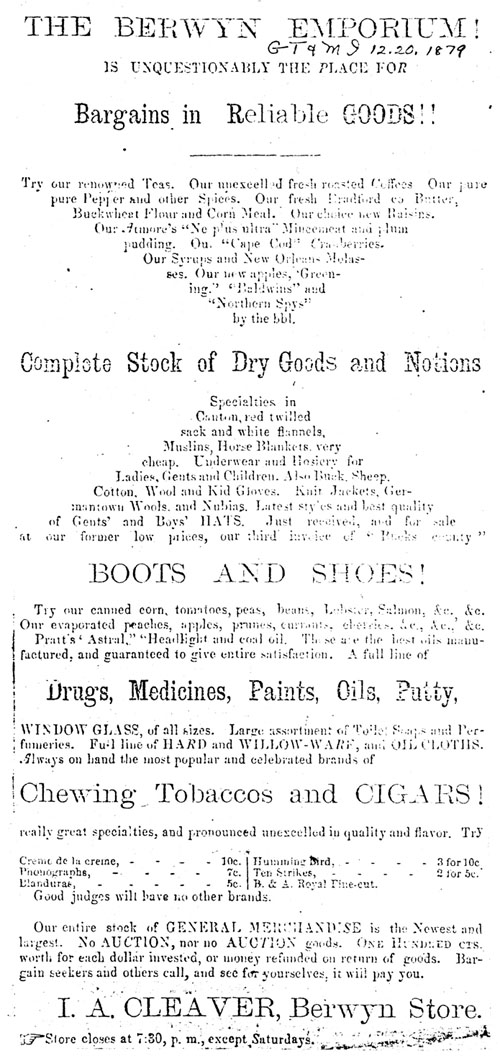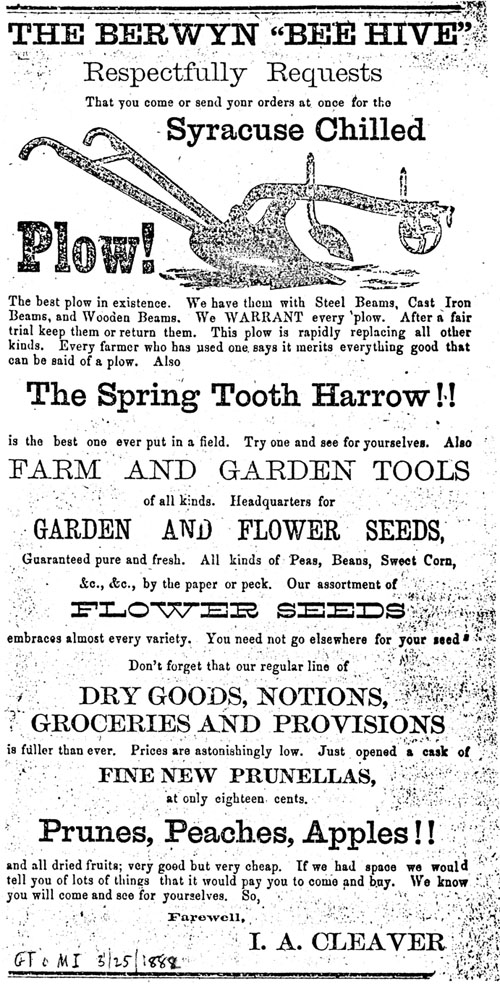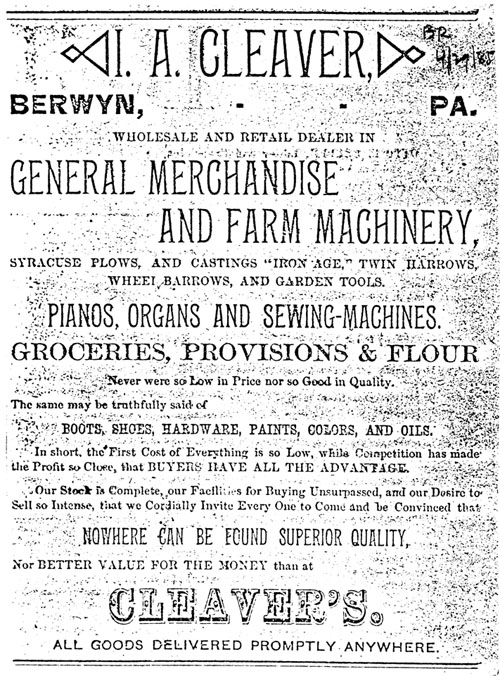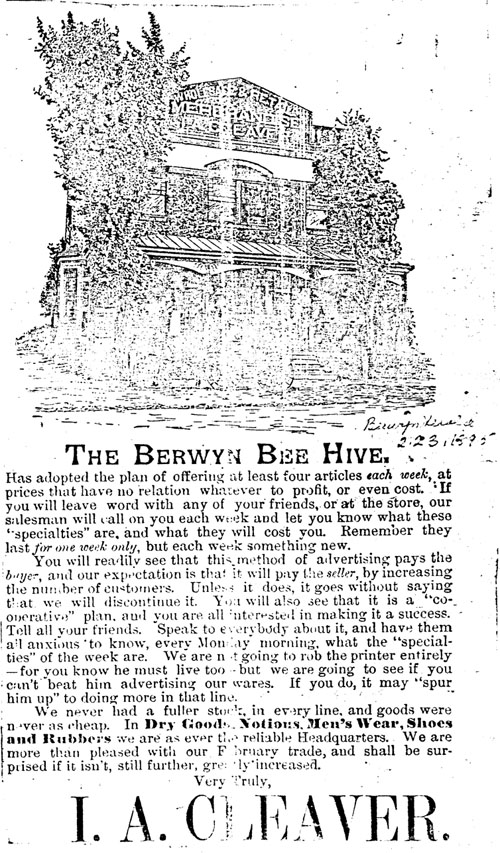|
Home : Quarterly Archives : Volume 19 |
Tredyffrin Easttown Historical Society |
|
Source: October 1981 Volume 19 Number 4, Pages 113–120 Piddle Paddles and Crying Necessities Five Advertising for I. A. Cleaver's Store What kinds of merchandise were carried in the village general store of the latter part of the nineteenth century? The variety of goods and commodities offered for sale in the store of I. A. Cleaver in Berwyn is indicated in the newspaper advertisements on the following pages. They originally appeared in local newspapers — the Green Tree and Malvern Item, the Berwyn Record, the Berwyn Herald, and the Malvern Item — between 1879 and 1895. Isaac A. Cleaver started his first store in what is now Berwyn in 1867. He was born in Radnor Township on May 12, 1843. At the age of 18 he enlisted in Company C (the Paoli Guards) of the 97th Penna. Volunteers. Promoted to the rank of sergeant, he was wounded at the Battle of Bermuda Hundred in Virginia on May 20, 1864. On September 17th of that year, at the expiration of his three-year enlistment, he was mustered out of the service. The following January he was married. He then engaged in farming for three years, before "embarking in the mercantile business" (as Sara Nuzum described it in the April 1965 issue of the Quarterly.) His first store was "an old store stand" in Reeseville, but he soon outgrew its facilities. In 1870 he built a larger store and residence on the Turnpike at the eastern end of the village. The new store was known briefly as the "Pinafore", and Cleaver, as its proprietor, was referred to in the press as "the Admiral". From the early 1880's on, however, the store was called the "Beehive". A fire, started when some coal oil in the basement caught fire from a candle, threatened to destroy the store and its contents in late August of 1875, "but, as reported in the West Chester Daily Local News in the following week, "the timely application of blankets" saved the property, (in battling the flames, however Cleaver "had the whiskers burned off his face", it was also reported.) In the spring of 1879 a number of improvements were made in the store, among them "a new ceiling of beautiful grain, white-ash lumber; woodwork repainted and revarnished; [and] a large handsome bay window for the office-room and post-office". Also added was "a row of substantial sheds for his customers to drive under with their teams while visiting the place". The store was described in the Local in April 1879 as "admitted to be as handsome as any in the state". The first three advertisements show not only the extent of the inventory of I. A. Cleaver's store at this time — grocery products, flour, dry goods, notions, horse blankets, clothing, boots and shoes, fish, vegetables, fruits, coal oil, drugs, medicine, paints, glass, hardware, chewing tobacco, cigars, general merchandise, plows and harrows, farm and garden tools, garden and flower seeds, wheel barrows, and even pianos, organs, and sewing machines — but also the manner in which they were advertised. (In June 1879 Cleaver also opened "an ice cream, fruit and confectionary saloon in the meeting room of the public hall" to augment the various items available in his store!) By March of 1880 it was reported, "Trade ... is brisk, judging from the lively times about Isaac Cleaver's store. He is always to be found at his post, accommodating and lively as ever. He says business was never more prosperous than at present." By 1888 it was necessary to enlarge the store, and another major remodeling project was undertaken. "Mr. Isaac A. Cleaver, dealer in general merchandise," it was reported in the Local in March, "is contemplating extensive improvements in a few weeks. His present large frame building now used by him for dwelling and store purposes is to be bodily removed to the rear portion of the lot and upon another street, where it will be remodeled and made into two good dwelling houses. On the store site a large stone store building will be erected and in all appointments will conform to the progress of the age and the push and forward tendency of Berwyn". The new store building was 44 by 60' in size. As the project was nearing completion, in late October of that year, once again the enterprise was threatened by fire, this time the result of a defective flue. Attending the evening service at the Baptist Church, of which he was a deacon, Cleaver was notified his house was on fire. As reported in the Local, "Mr, Cleaver hurriedly left the church, and the pastor, learning the cause of the commotion at Mr. Cleaver's pew, informed the congregation of the cause, and telling them they could do much better service by helping to save a brother's property when in danger, the congregation soon emptied the church and were swarming around Mr. Cleaver's large store warehouse and residence two blocks away." Even with all this assistance, the fire, fanned by a high wind, "spread with such rapidity that only about half the store contents, furniture, &c. could be saved". Despite the loss, however, ten days later it was reported, "It was not 60 hours after Isaac A. Cleaver1s store was burned recently before he had opened his new store and was selling goods." The new store, as recalled by Franklin Burns, "was outwardly on the model of the average country emporium with Taj high porch where the brooms, rolls of barbed wire, etc. were displayed, but in the interior new departments were added, namely furniture and millinery on the second floor, and a butcher shop in the rear. A bookkeeper had his booth in the centre of the first floor and the proprietor had his own office inside a railed enclosure beside the front bay window. The corps of sales people and drivers were increased to a dozen." Again, the variety of merchandise stocked, as well as an illustration of the new store and one of its delivery wagons, is shown in his newspaper advertisements. Unfortunately, the business did not continue to prosper. The loss in trade has been attributed to several factors: in part to the proprietor's many outside interests (among them postmaster, school director, vice president of the Berwyn National Bank, president of the Village Improvement Association, treasurer of the Berwyn Building & Loan Association, prominence in the G.A.R., captain of the Easttown Republican Club, and, as noted earlier, a deacon of the Baptist Church and much involved in a schism within the church); in part to new competition from the establishment of rival stores; and perhaps in part to his liberal credit policies, which resulted in a considerable amount of uncollectable accounts on the books. Whatever the cause, as a result, in 1896 the business was sold at a sheriff's sale for $500, although before he died in 1909 Cleaver paid off all his old debts. Following the sale, the "Beehive" continued operation as a general store under Adam H. Schlosser until his death in 1902. At that time it was divided into two stores, the east side a meat and grocery store operated by Blake and Clements; and the west side a dry goods and furniture store operated briefly by John Bergey and then by Karl Lichtenfield. (Its subsequent history has been described by Sara Nuzum in her article in the April 1965 Quarterly, Volume XIII, Number 3.) On the following pages are five newspaper advertisements for the store of I. A. Cleaver in Berwyn. They show the kinds of merchandise carried in a village general store of that period — both fiddle faddles and crying necessities.
from the Green Tree and Malvern Item December 20, 1879 (Chester County Historical Society)
from the Green Tree and Malvern Item March 25, 1882 (Tredyffrin Easttown History Club)
from the Berwyn Record April 29, 1885 (Tredyffrin Easttown History Club)
from the Malvern Item October 31, 1891 (Chester County Historical Society)
from the Berwyn Herald February 23, 1895 (Chester County Historical Society) |




